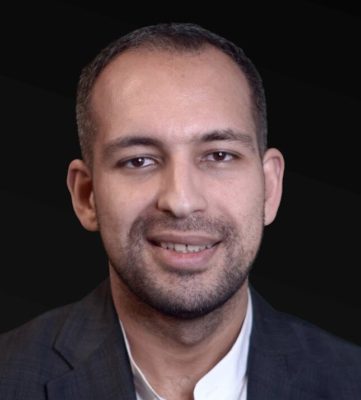Part 3: Interview on the pharma industry with Haider Alleg, Global Head of Digital Excellence, Ferring
In this three-part series of interviews, leaders in pharma and healthcare digital and marketing discuss the new tools, technologies, innovations, trends and opportunities that will shape – and transform – the life science industry and its relationship with partners and patients. Despite the challenging conditions, leaders from the industry met, virtually this time, to learn and discuss the future of the industry at Eye for Pharma Philadelphia 2020—the event has since become part of Reuters Events Pharma.
In this interview, SciencePOD speaks with Haider Alleg, Global Head of Digital Excellence, Ferring. This is the third part of a set that also includes interviews with Christina Kim, EVP Data Analytics, Omnicom Health Group and Francesca Wuttke, Chief Digital Officer at Almirall.
>
“Pharma is the last big industry waiting to be disrupted. They can be witnesses, players or engineers of that disruption: the choice is theirs.”— Haider Alleg
When you survey the innovation landscape beyond pharma, where do you draw inspiration? What industries, companies, and/or methodologies do you think pharma could learn from when it comes to customer engagement, for example?
I am inspired about the fintech industry, where they had to find collaboration models between emitter and acquirer and network provider to deliver value to the end users, while disrupting the old banks. I found the analogy quite interesting. From a customer engagement perspective, I am looking to brands that have a deep sense of building a cultural fit with their audiences. For instance, FMCG brands that have that deep connection beyond transactional touch-point such as Tesla and Red Bull.
The future of pharma
What skills and processes are essential for future pharma leaders?
Entrepreneurship. I would almost argue that leadership is a skill, or a muscle pharma people should really pay attention to. Curiosity and pragmatism. You also need to have a lot of resilience as you have to fight the “no you can’t”. Creativity would always be useful to come up with a solution for your patients.
What’s the scale of the opportunity: to what extent can pharma benefit from new tools and platforms being pioneered outside the industry?
I see 2 types of evolution:
Pharma that becomes tech companies. They will buy, hire and evolve into hybrids. Roivant or Novartis are examples of such evolution (or attempts).
Pharma partnering with tech companies. They will stay true to their core, but perhaps lose the touch-point battles. The risk being that they will have to see their customers through the lenses offered by their partners.
There are no good or bad models. It depends on your survival instincts and you will see how adaptable they are. Medical devices companies or pharma that do have consumers/OTC branches would fall more into the first bucket. Specialty pharma like Ferring would therefore perhaps feel more comfortable with the second one.
Turning to communication and content: what distinguishes pharma’s content needs from the content needs of non-pharma or non-scientific industries?
I believe this is what would keep pharma floating. The academic approach of being scientific, precise and relevant is pretty much what the web is missing now. Authority in a topic would distinguish them from others. Example: if you are running an Alexa search voice in a few years, I am hoping that because of that approach, pharma content would be the top-rated answer.
How do you think the emergence of big tech giants will affect pharma (especially those moving into the health space, for example, Apple)?
I don’t believe we will see a tech company becoming a healthcare player, except Amazon. It feels that they are more looking to sell the shelves to dig the sciences, than digging themselves. I see Apple becoming a medical device company with the amount of patents they push in the pipe. I see them more building a platform like an Apple Store for medical devices for the industry. I see Google more as a tools / service company to the industry.
In all, it truly depends on what would be the definition of healthcare tomorrow? What we call healthcare today might not be the definition of tomorrow. Prevention or support would perhaps be healthcare and in this sense, you are looking at way more companies entering that arena, including Walmart.
What do you hope the key take-aways will be for eyeforpharma attendees?
Pharma is the last big industry waiting to be disrupted. They can be witnesses, players, or engineers of that disruption: the choice is theirs.

